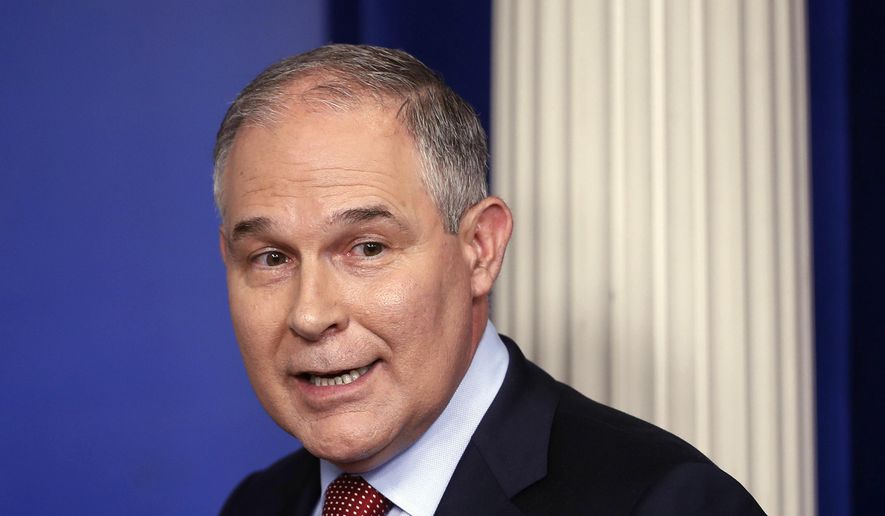The ethanol industry and its backers on Capitol Hill scored a major victory last week over Scott Pruitt by pitting the Environmental Protection Agency chief in a battle against his boss, President Trump — boxing him into a political corner and ultimately getting concessions on nearly all of their policy demands.
In a letter to lawmakers, Mr. Pruitt announced that he would forego rumored changes to the Renewable Fuel Standard (RFS), the federal law that requires the blending of ethanol with gasoline and had become a major flash point over the past several months. Mr. Pruitt’s EPA had been considering lowering the mandated volumes under the RFS, allowing exported fuel to count toward the yearly quotas, and other steps deeply opposed by biofuels proponents.
The EPA chief changed course after a nearly unprecedented public relations campaign from ethanol industry leaders and key lawmakers such as Sen. Chuck Grassley, Iowa Republican, who threatened to hold up several top-level EPA nominees until Mr. Pruitt changed course on the RFS.
Mr. Grassley and his allies were successful by pitting Mr. Pruitt against the president. Throughout his campaign, Mr. Trump had expressed unwavering support for the ethanol industry, while Mr. Pruitt, while serving as Oklahoma’s attorney general, had been critical of biofuels and of the RFS specifically.
By painting Mr. Pruitt as a potential enemy of the president’s agenda — and of the rural voters in Iowa and other Midwestern states that brought Mr. Trump to power — the pro-ethanol side flexed its political and came out with a major victory.
“Administrator Pruitt should be commended for following through on President Trump’s commitment to biofuels and the RFS,” Mr. Grassley said Friday in a statement. “The previous proposal would have gone against President Trump’s support for biofuels and what he said to Iowa and the nation and to me personally. Congress intended and President Trump pledged to support biofuels. I’m glad EPA is showing that it’s committed to the President’s agenda. I’m also glad EPA is backing away from any attempt to change the point of obligation. Doing so would have financially burdened local retailers and other small businesses across the country.”
The ethanol industry cast Mr. Pruitt’s change of heart as an “epiphany” — a not-so-subtle hint that many in the sector believe the administrator actually wants to roll back the RFS but is unable to do so for political reasons.
“The U.S. ethanol industry is grateful for Administrator Pruitt’s epiphany on the road to the RFS,” said Bob Dinneen, president and CEO of the Renewable Fuels Association, the ethanol industry’s top trade group. “We look forward to working with EPA to preserve and grow the RFS, encourage innovation in the production and marketing of biofuels and secure common-sense reform in the regulations that have kept higher-octane ethanol fuels from being sold year-round.”
Specifically, Mr. Pruitt said proposed blending volumes under the RFS will not be cut any further than the preliminary levels released over the summer, putting an end to fears that the Trump administration would try to gut the program. He said the final levels actually could be higher.
The administrator also said his agency wants to work with Congress to offer year-round access to E15 — gas with 15 percent ethanol — which currently isn’t available during summer months due to ozone concerns. The ethanol lobby has made a push for year-round E15 a top priority, and Mr. Pruitt’s openness could jump-start the matter on Capitol Hill, where opposition from Western Republican lawmakers has kept it from moving forward.
Mr. Pruitt also said the EPA will scrap plans to count ethanol exports toward RFS volumes every year. That proposal, ethanol industry leaders say, would’ve run counter to the spirit of the RFS, which, at its core, was designed to strengthen America’s energy independence.
“I reiterate my commitment to you and your constituents to act consistent with the text and spirit of the RFS,” Mr. Pruitt said in a letter to Mr. Grassley and other lawmakers. “I take seriously my responsibility to do so in an open and transparent manner that advances the full potential of this program as envisioned by Congress, rural America, and the president of the United States.”
• Ben Wolfgang can be reached at bwolfgang@washingtontimes.com.




Please read our comment policy before commenting.